Error Handling in Mule
The new Error Handling is one of the major changes introduced in Mule 4 and it's better and more efficient according to one person.
Join the DZone community and get the full member experience.
Join For FreeThe new Error Handling is one of the major changes introduced in Mule 4. It's better and more efficient. Although it may seem complex to some, it's made complex for good.
To begin with, the message exceptions can now be handled at 3 different levels i.e. application, flow, and processor levels, as shown below.
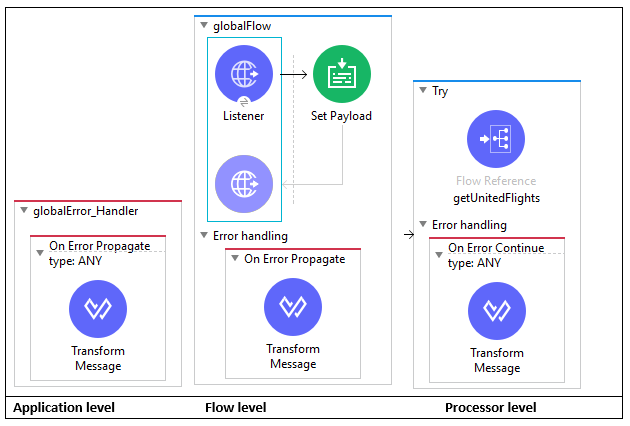
The handlers written at the application level are global handlers, which can be used to handle the errors thrown by any flow, which doesn't have its own error handling.
If there is no error handling written at any of the levels, the Mule Default Error Handler is used, which stops the execution of the flow and logs the exception.
The Mule Default Error Handler is not configurable but, can be replaced by our own Global error handler by creating a Configuration global element.
About Error Objects
Every error that is thrown, creates an Error object named as follows — Namespace (eg. HTTP) and Identifier (eg. BAD_REQUEST)
Eg. HTTP: BAD_REQUEST, WSC: CONNECTIVITY, VALIDATION: INVALID_BOOLEAN
Each error object has 2 properties:
error.errorType — an object holding the Namespace and identifier
error.description — a string holding the error message
All the errors follow a Hierarchy as shown below. “ANY” is the most Generic parent.
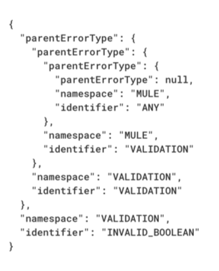
About Error Handler Scopes
There are two error handler scopes in Mule 4, i.e., On Error Continue and On Error Propagate, which can be used to handle different kind of errors at all three levels.
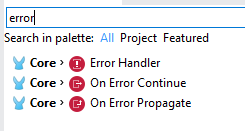
The ON ERROR CONTINUE scope always returns a success response to the next level, while the ON ERROR PROPAGATE always propagates the error to the next level and returns an error response to the next level.
Each scope can have one or more message processors.
About Global Handlers
To handle errors at the application level, add an error handler in the global.xml (or simply outside a flow).
Then, create a Configuration element in the global elements, which sets the Global Error Handler as the Default Error Handler.
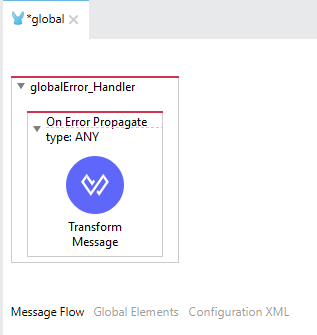
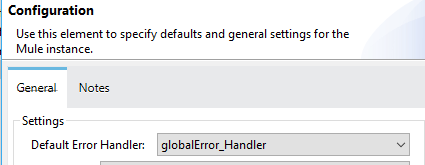
To create a generic handler for handling all the errors, specify the TYPE as “ANY” in the error scope of the Global Handler. To handle multiple errors, different type, or errors separately, specify the errorType of the error in the Type box of the error scope.
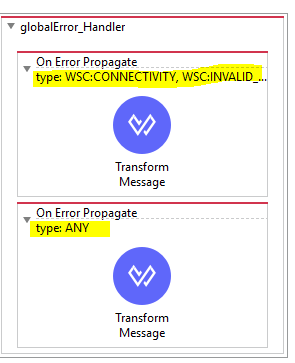
The error will be handled by the first scope, which meets the errorType.
About Flow Level Handlers
Flow level handlers can be added to regular Flows and private flows, but not to Subflows.
If an error that is thrown in the flow, doesn’t find a matching scope for its errorType in the Flow’s error scopes, it DOES NOT go to the application level handler, instead, it uses the Mule Default Error Handler.
About Processor Level Handlers
To handle the errors at the processor level, add one or more processors into a Try Scope and handle it using the On Error Propagate or On Error Continue Scopes.
The error scopes at the processor level take precedence over flow-level scopes. Flow-level scopes take precedence over application-level scopes.
It would be a good idea to have an error scope with Type specified as ANY in each level to avoid getting unexpected errors propagated to next levels.
Finally, the most important and challenging part of the new error handling is to choose between On Error Propagate and On Error Continue Scopes. Select them according to the business requirement or logic. For eg.: If you want the child flow to return a success to parent flow so that the parent flow continues, use On Error Continue. Similarly, use On Error Propagate when you may want the error to be propagated from child flow to parent flow and return an error response.
Opinions expressed by DZone contributors are their own.

Comments